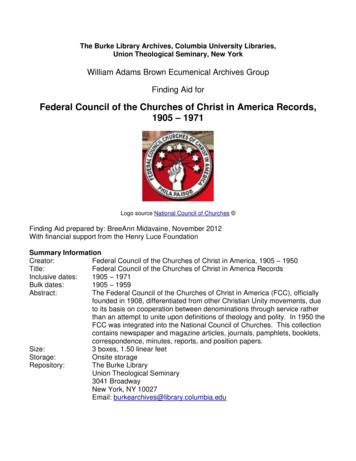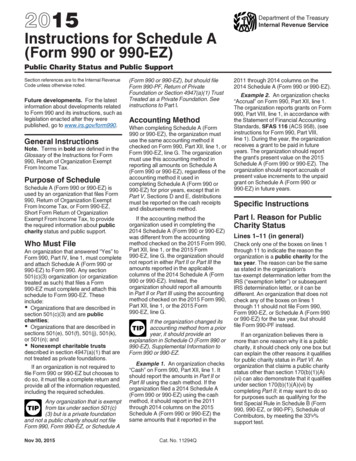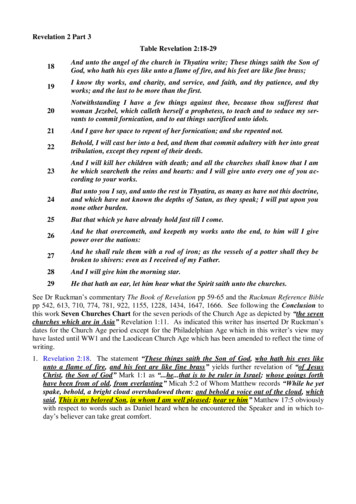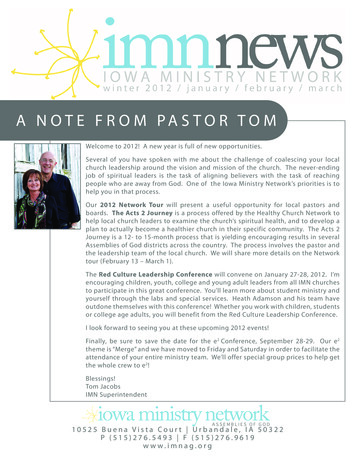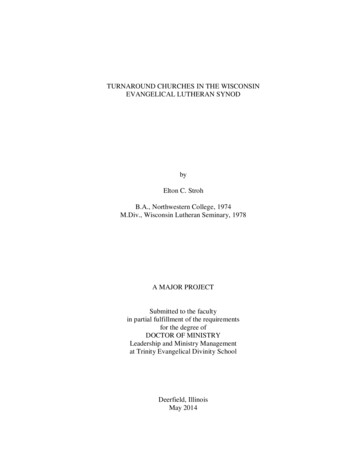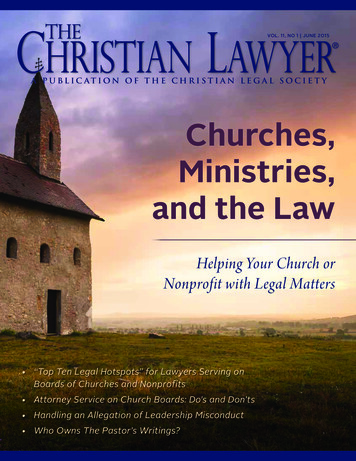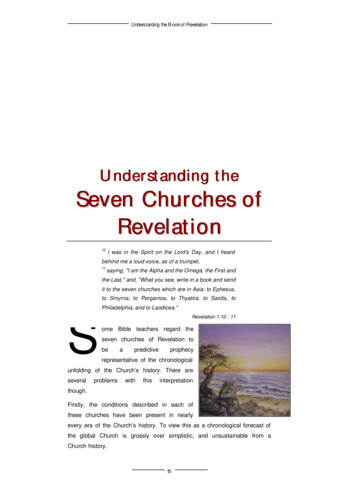
Transcription
Understanding the Book of RevelationU n de r st an din g t h eSeven Churches o fRevel ati o n10I was in the Spirit on the Lord's Day, and I heardbehind me a loud voice, as of a trumpet,11saying, "I am the Alpha and the Omega, the First andthe Last," and, "What you see, write in a book and sendit to the seven churches which are in Asia: to Ephesus,to Smyrna, to Pergamos, to Thyatira, to Sardis, toPhiladelphia, and to Laodicea."SRevelation 1:10 - 11ome Bible teachers regard theseven churches of Revelation tobeapredictiveprophecyrepresentative of the chronologicalunfolding of the Church’s history. There stly, the conditions described in each ofthese churches have been present in nearlyevery era of the Church’s history. To view this as a chronological forecast ofthe global Church is grossly over simplistic, and unsustainable from aChurch history.15
The Seven ChurchesSecondly, it makes no sense for the Lord to command John to write to whatwe know were seven actual churches and cryptically invent scenarios thatdidn’t actually pertain to them. If this had been the case, this epistle fromJohn would have been dismissed as uninspired and thereby rejected fromthe Canon of Scripture very early. But it wasn’t. This seems to suggest thatthe initial recipients acknowledged it as being truly insightful into theirchurch’s condition and presumably responded accordingly. This initialacceptance by these seven churches of what we know as the first threechapters of the Revelation would have also given added credibility to theremainder of the Book. Indeed, since it was readily accepted as integral tothe Canon very early in the formation of the Canon we could also surmisethat what appears to be very enigmatic to the modern reader may not havebeen so to the first readers.Remember the theme of the Book when reading about these churches? HowChrist describes Himself to these churches is often overlooked by thosemore interested in speculating about what it might say about the futurecondition of the Church.ChurchRevelation of ChristEphesus2:1 Christ relates to His churches through God ordained authority (stars). He is One who hasauthority and relates to His Church through His appointed authority. This does not mean thatChrist is ‘authoritarian’ and thereby aloof, rather, He is authoritative and imminent (close) to HisChurch – He “walks in the midst of the seven golden lampstands.”Smyrna2:8 Christ is in absolute control of the universe. He is First. While this world wars against theChurch through futile efforts to destroy it and it may at times look like the Church will not survivethe barrage of unreasonableness, Christ is there at the Last, and so will His Church be also.While the Devil thought that he had conquered Christ when Jesus died on the Cross, it turnedout to be his greatest humiliation (Col. 2:15). So too when believers die for their faith the worlderroneously considers it a victory for their cause, but ironically the victory is ours! Thus Christwas dead, but is now alive forevermore.Pergamos2:12 Christ is a Just Lord- He will execute judgment on His enemies- He has a two-edgedsword in His mouth. Unlike mortal rulers, Christ’s words are more powerful than any humanweaponry. Never underestimate the words of Christ!Thyatira2:18 Christ sees all and will hold the guilty to account. Fire nearly always represents judgmentin Scripture and Christ’s eyes are described as being like fire. Only He is qualified to judge sinceHe Himself has been judged and found innocent- He has feet like burnished bronze (brass).Burnished bronze in the Old Testament spoke of that which withstands judgment (hence it isburnished). One such example of this is found in Numbers 16:39-40.Sardis3:1 Christ loves His Church deeply. He is the One who gives His Church the Anointing – theSeven Spirits of God - (1John 2:20), and anointed ones – Stars - (Eph. 4:11).Philadelphia3:7 Christ is without compromise: He is holy and true.Laodicea3:14 Christ fulfils the Word of His Father- He is the Amen, Faithful and True. He is thebeginning and source of all that has been created, He therefore has the right to judge the earth.16
Understanding the Book of RevelationIt’s actually quite refreshing to avoidspeculating about whether the Lord’smessages to these churches aresome cryptic predictions about theChurch throughout the Ages. Instead,as we try to look over the shoulder ofthe original readers we can see howthis revelation of Christ would have given them so much strength andcourage. Imagine living during a time when becoming a Christian could costyou your life because you were seen as a threat to the stability of the Empirewho would mercilessly deal with such threats. Imagine living during a timewhen being a Christian meant that you would be ostracized by your family,friends, and community, who would ruthlessly slander you for your faith inChrist. Imagine also living at time when you had been told that there wasonly a short time before Christ would return and bring all of creation undersubjection to His authority, yet the longer you believed the less likely itseemed. Imagine how it must have felt to the first century Christians whowitnessed some of their brothers and sisters being publicly martyred, and tosee others openly forsaking their faith in Christ.But what about how John the apostle must have beenfeeling? He had oversight over at least seven churches.He knew that some of these churches were struggling inthe midst of all this pressure. Some of them lating wealth and a corresponding prestige(Rev. 3:17). Others had just grown complacent therebylosing their zealous passion for Christ and His cause(Rev. 2:4). Still others had downright succumbed to animmorality-is-tolerated attitude (Rev. 2:20) which wasdestroying them in the process. John must have beenToday it ispossible tobecomedistracted withso muchadministrationand gadgetrythat we canalmost leaveChrist out ofthe Christianequation.tempted to despair. Everything looked like it was going awry.Christ’s last words before His ascension stated His lordship over everythingbut there was little visible evidence of it. Christ’s last commission was to takethe Gospel to the ends of the earth and make disciples of all nations- but allthe nations were rejecting the Church and killing its servants. Christ said Hewould return soon- but time was dragging on and there was no sign of Hiscoming.17
The Seven ChurchesSome of these issues are addressed in this Revelation. But the focal point ofthe Book of Revelation is not to make fanciful predictions about the future,but to point the reader back to Christ! The message contained in Revelationis a message that spoke straight into the hearts of the first hearers and stillspeaks with special power today.T HE M E S S AG E S T O T HE S E V E NCHUR CHE S AN D T OD AY’ SAP P L I CAT I ON Ephesus Christ commended the Ephesian church for their hard work. They were achurch which cared for elderly widows (1Tim 5:3), preached the Gospel inthe midst of opposition, and sought to be diligent to the Lord’s instructions(we draw these conclusions from Paul’s epistles to the Ephesians, First &Second Timothy, and Acts 20).18
Understanding the Book of RevelationToday we should understand that Christian service requires diligence andhard work. They did not tolerate those who were evil. Today we shouldguard what we put aside in the name of “grace” and ensure that our gracedoes not become “disgrace” because we accept or tolerate what is evil. Theytested those claiming to be apostles and found many of them to be liars. Thisimplies that the apostolic ministry was not limited to the original disciples ofChrist but is a ministry gift given by Christ to the Church to bring it tomaturity. Apparently there were many who were claiming apostolicity (thatthey were apostles), but neither had the gifts nor the character tosubstantiate their claims. Today we should be very careful about bothclaiming to be an apostle and recognising someone as having an apostolicministry when we have not tested their claims first.The Ephesian church had lost its first love for Christ. Today it ispossible to become distracted with so much administration andgadgetry that we can almost leave Christ out of the Christianequation. Love is the only appropriate response to Christ at any time. If thereis no love in the church for Christ there is no need for it to exist- hence Christsays He would remove their lampstand (Rev. 2:5, which is symbolic of theirwitness as a church). In gracious conclusion Christ commends theEphesians for being against the Nicolaitans who taught that there was apriestly class within Christianity. Today we should be especially on guardagainst teaching that contradicts the priesthood of all believers.Smyrna The church at Smyrna was also commended for the hard work. May we gainan understanding that ‘success’ in the church (which is measured by ourobedience to Christ) actually demands work. “Work” may best be describedas toiling under a certain degree of duress. In other words, work is doingwhat you have to do, even when you may not want to do it. Even asenjoyable as a job might be, there will always be moments when it reallybecomes “work”. It’s the same in church. There are some things that have tobe done under a certain degree of duress! Elders who labour in preparationto preach may feel that their efforts go unnoticed and unappreciated.Deacons who spend hours stocking the church’s pantry to show hospitalityto others who take for granted what they enjoy (food and drink and service)may feel that their efforts go unnoticed and unappreciated. The worshipmusician who spends hours learning a worship song so that they can beliberated from the sheet music to truly worship may feel that their efforts go19
The Seven Churchesunnoticed and unappreciated. But the work done by these servants isnoticed and is appreciated! Even though there may not be any humanaccolades, the Lord Jesus Christ sees the work that was done. And Heregards it as work done for .preparedtowasTodayweendurethediscomfort that comes from standingup boldly for Christ. While the churchat Smyrna felt inadequate due to theirlack of resources, it actually resulted in them having to depend upon theLord which in turn made them “rich” in the eyes of the Lord. As wealthy andas well as we may resourced, if we become self-reliant we quite possiblycould become spiritually bankrupt! We need to live dependant upon theLord.Excise all the references to heaven from the New Testamentand you have very little left. Saint Teresa said, ‘In light ofheaven, the worst suffering on earth, a life full of the mostatrocious tortures on earth, will be seen to be no more seriousthan one night in an inconvenient hotel.’Saint Teresa, cited in THE CASE FOR FAITH, Strobel, page 65As also said to the church at Ephesus, Christ makes reference to“overcoming”. For the Ephesians Christ said that overcoming would qualifythem to eat from the tree of life in the Paradise of God (Rev. 2:7). For thosein Smyrna Christ said that overcoming the pressure to abandon Him wouldshield them from the second death.Pergamos Christ’s statement confirming that He knew the works of the church atPergamos is encouraging. What we do for Christ is not unnoticed. Unlike theother two churches already addressed, Christ says that He was also awarethat the church at Pergamos was physically located in a very difficult area.He described Pergamos as where Satan’s throne was. Interestingly He gavethem no command, instruction, or edict to confront Satan in what many todaypass off as “spiritual warfare”. (For more on this issue please refer to mybook on An Examination of Spiritual Warfare.) In the midst of much spiritualopposition they had held fast to the Lordship of Christ even to point of layingdown their lives in martyrdom (verse 13). Christ’s restatement that this was20
Understanding the Book of Revelationwhere Satan dwells seems to give the insight that the martyrdom of Antipaswas not the mere machinations of flesh and blood (Ephesians 6:12), but adeliberate plot of Satan designed to destroy the church.But Christ had some disappointments with the church at Pergamos. Theyhad some people in the church who held to a false doctrine which endorseda form of idolatry and sexual compromise. This is referred to as the teachingof Balaam. Today we must guard what doctrines are tolerated in the church.Wise pastors know how to gently correct the erring but teachable. But it isvital to also know how to confront and address those who hold to dangerousdoctrines because their beliefs will eventually harm themselves and others! Ifwe could believe anything then Christ would not address these two subtledoctrinal errors.The second doctrinal error is that they had some who held to the doctrine ofthe Nicolaitans. No can be sure at this stage (perhaps some manuscripts orarchaeological data is yet to be discovered) exactly what this meant. Butthere is good reason to believe that this doctrine was the beginning of ateaching which drew a line of distinction between those who had receivedholy orders (cleros from where the word clergy comes from) and laity(ordinary). Hence it is speculated that the term Nicolaitans meant nico –over, laitan – ordinary; the doctrine of a priestly class of believers lording itover ordinary believers. Christ said that He hated this doctrine of theNicolaitans. His instructions for dealing with this doctrine are short:: repent.And His warning for not doing so is severe: I will fight against them with thesword of My mouth. Today we must guard against elitism in the church. Wemust also understand the New Testament teaching on the priesthood of allbelievers which negates the possibility of a New Testament priestly class.Whenever the expression he who has ears let him hear is used it demandsthat the reader look beyond the natural implications of what has been said(note Isa. 6:10; 42:20; Jer. 5:21; 6:10; Ezek. 12:2; Matt. 11:15; 13:16). Thisnecessitates that we understand that Christ is saying something that goesbeyond what it immediately may sound like. We all (generally) have ears, butChrist is referring to understanding something that may not be immediatelyobvious. He makes this statement to each of the seven churches and it isstill true today.21
The Seven ChurchesThyatira Christ commended the church at Thyatira for increasing their good works(2:19). But Christ condemned them for tolerating sexual immorality. Onedisturbing New Testament Manuscript describes this Jezebel as “your wifeJezebel” (refer to the translator’s footnote in the NKJV). If this was the case,then it makes the charge all that more serious. Since this was addressed tothe star of Thyatira, which we regard as the leader of (messenger to) thechurch, then that particular manuscript suggests that this corruption wascoming from very close to the top. The Lord said that He was going to castthis woman onto a sickbed (vs 22) and bring great tribulation on those whohad committed adultery with her. This reference to a woman does notappear to be symbolic language. It has all the hallmarks of talking about areal character and situation in the church at Thyatira. But we can drawlegitimate lessons from this for today in regard to tolerating immorality withinthe church.The Lord also warned those who followed this woman. Christ warnsthat they were in danger of “great tribulation”. We know thatCaesar (Titus) Vespasian launched a campaign of terror againstthe Jews throughout the Empire around 70AD in which some Christianssuffered as well. These followers of the woman Jezebel are called herchildren (vs. 23). John also referred to his disciples as his children (1John2:1; 3:7). We should be on guard against any teaching that says that theLord punishes children for the sins of their parents."Fathers shall not be put to death for their children, nor shallthe children be put to death for their fathers; a person shallbe put to death for his own sin.”Deuteronomy 24:16To interpret this verse as saying that the Lord Jesus would kill this woman’schildren is an error. Clearly the reference to children is to her followers. Tobe killed with “death” (verse 23) is akin to dying of pestilence- a wastingdeath brought about by disease.I will kill her children with death, and all the churches shallknow that I am He who searches the minds and hearts. AndI will give to each one of you according to your works.Revelation 2:23The purpose for the Lord in dealing with these people so severely was toestablish a clear message to all the churches that He would not tolerate sinin His Church. People often fail to understand that while God is absolutely22
Understanding the Book of Revelationgracious, He remains absolutely just. God did not stop being just in the NewTestament! He was, is, and always will be just. He “searches the minds andhearts” is a timely reminder to us just as it was to the original recipients thatChrist will judge our actions and motives (refer to Matthew 5:28).But not everyone in Thyatira had fallen prey to the corruption of falsedoctrine and immorality though. For these believers, it must have been toughto remain loyal and faithful in the midst of so much opposition. Graciously,the Lord Jesus says to these battered believers that He would lay no furtherburden on them vs. 24. Perhaps you have felt overwhelmed by life and yourspirituality has suffered as a result. This can often lead to a downward spiralof guilt and condemnation. Take heart. Remain faithful to Christ and He laysno further on you.As a pastor I have had to counsel people with the Word of Godthrough some tough periods in their life. They have confessed tome that they have felt ashamed because they weren’t able to readtheir Bible as much as they had been used to, or prayed with the reverencethey had previously grown to enjoy, or serve in the church with the diligencethey knew was deserved. During these tough times, my pastoral counsel hasoften reflected Christ’s words to the battered believers.Sardis Some scholars have noted that there seems to be a progression ofdeteriorating conditions in the seven churches listed. As I’ve previouslystated, there is no Scriptural or logical reason for doing this. These Historicistscholars regard the church at Sardis as representing the Church at the pointof the Reformation (early 1500s) because this church was “dead” and theirworks were no longer perfect (Rev. 3:1). That’s how the Reformers regardedthe (Roman Catholic) Church of their day. They also felt that their reformingwork was ushering the Church into the Philadelphian Age. This is readingtoo much into the text when we consider that the hermeneutical principle ofaudience relevance demands that we regard Christ’s words to the leader ofthe church of Sardis as pertaining immediately to them.Each of these messages to the seven churches is primarily addressed to the“angel” of the church. The Greek word translated into English as “angel” isthe word angelos which literally means messenger. It is used in the New23
The Seven ChurchesTestament of both earthly and heavenly messengers. Since Christ is givingthis message to the leader of the church at Sardis we note that he hadceased to “watch” and grown weak in good works and thus affected thewhole church.The term “watch” is an Old Testament term. In the Old Testament it was thewatchmen who were responsible to hear from God and deliver His Word, butthey had failed to do so.Also, I set watchmen over you, saying, Listen to thesound of the trumpet But they said, We will not listen.Jeremiah 6:17The church at Sardis had failed to watch. The correlation between the leaderof a church and the spiritual depth of a church is now well established. Manypeople who move into a new area, and look for a new church home, makethe mistake of basing their evaluation of a new church purely upon what thechurch offers them and their family rather than on who might be leadingthem. The leader of a local church has the privilege of setting the spiritualpace and tone of a church, and those who align themselves with a churchwill be influenced by the spiritual depth of the leader.To this leader, and church, Christ commands that they rememberwhat they heard and return to it (repent). They are then told towatch. To “watch” demands prayerfulness, prophetic proclamationand heeding the word of God. Today we should also be watchful by givingourselves to prayerfulness, obedience and boldness in proclaiming God’sWord. For the church at Sardis this was apparently their last opportunity todo so.Even in this church which looked alive, but was dead (Rev. 3:1), there weresome who had not “defiled” their “garments”. This expression generallyrelated to sexual morality.Moreover you shall not lie carnally with your neighbor'swife, to defile yourself with her.Leviticus 18:20Christ promised those who had not defiled their garments that they would beclothed in white. This is an expression that is used several times inRevelation and speaks of the believer’s resurrection with ‘garments’ ofrighteousness (Rev. 4:4; 7:9).24
Understanding the Book of RevelationAnd to her it was granted to be arrayed in fine linen,clean and bright, for the fine linen is the righteous actsof the saints.Revelation 19:8Philadelphia The Reformers believed that they were ushering in the Philadelphian Age ofChurch history. They believed that they were bringing the Church back totrue brotherly love, which is what Phila (love) Delphia (brotherly) means. Tothis actual church Christ stated that He had “the key of David”. This is verysignificant considering the tone of Christ’s message to this church. What‘key’ did David have? Some regard the key to David’s success as hisgenuine love for others. He had an incredible ability to win people over.Christ has this same ability. Still other scholars regard this as an expressionwhich affirms Christ’s messiah-hood. He had the key of David to the true Cityof David- the New/Heavenly Jerusalem (Rev. 3:12). In the context of thisview Christ was affirming the Philadelphian church as being the rightfulcontinuation as the people of God rather than the apostate Jews of the localsynagogue. This makes sense considering Revelation 3:9Indeed I will make those of the synagogue of Satan,who say they are Jews and are not, but lie; indeed I willmake them come and worship before your feet, and toknow that I have loved you.Revelation 3:9The reference to “the hour of trial” in Revelation 3:10 is regarded by Futuristsas referring to a future “Great Tribulation”. If this “Great Tribulation” was yetanother 2,000 years away from the recipients of this message, then Christ’spromise to “keep you from” it, is absurd. There is a growing number ofscholars who acknowledge that this period occurred during the time leadingup to the destruction of Jerusalem in 70AD. Interestingly, the NewTestament uses three Greek words which are translated “world”. One ofthose Greek words is “oikoumene” which refers to the Roman Empire (notethe use of this word in Luke 2:1 and Romans 10:18). That is the word usedhere.Based on verse 11, something was very imminent: the coming of Christ tojudge. It is ridiculous to make this mean anything other than what it plainlysays therefore negating an interpretation which demands thousands of yearsof waiting in order to be fulfilled.25
The Seven ChurchesThe irony of verse 12 is that while Christ was about to do away with the lastvestiges of the Older Covenant by the destruction of the Temple in 70 AD,He promised to make the overcoming Philadelphian Christians “pillars” in thereal Temple in the real Jerusalem (the Heavenly one).Laodicea Historicists regard this church as depicting the last age of the Church. Theirview of the future Church was affected by their understanding that there hadto be a great falling away (2Thessalonians 2:3), a great betrayal (Matthew24:10), and a growing cold of the love of many for the things of God(Matthew 24:12). But these references relate to the time leading up to thefulfilment of what is referred to as the Olivet Discourse (the teaching of Christin Matthew 24). The events of Matthew 24 were related to the destruction ofthe Temple in Jerusalem and Christ’s judgment on those who had rejectedHim. Jesus said that all the events of Matthew 24 would take place within thelifetime of His disciples (Matthew 24:34). The references to apostasy andbetrayal are recorded in the New Testament as being fulfilled (NB. 2Timothy1:15).Also from a purely historic point of view the facts of Christianity’s growthtoday flies in the face of this age being considered the “Laodicean Age”.Never before in the history of Christianity have so many people beenconverting to Christ. This is taking place in both the Western world, the East,and the Middle Eastern world.The statements about this church are used to support a late date for thewriting of Revelation. In 62AD Laodicea experienced a major earthquake.Because the church is described as being wealthy, some scholars haveused this as internal evidence that Revelation must have been written towardthe end of the first century so that the Laodicean church would have hadtime to become wealthy. But this assumes, perhaps wrongly, that becausethere was a destructive earthquake in Laodicea that the church would havebeen financially or materially depleted. We know from historical documentsthat Laodicea rebuilt itself within a couple of years and was restored to beinga prosperous city within that time. So either way, this is a poor assumptionfor the late date of the writing of Revelation. Interestingly, we note Paul’sprayer for the Laodiceans recorded in Colossians 2 -26
Understanding the Book of Revelation1For I want you to know what a great conflict I have foryou and those in Laodicea, and for as many as have notseen my face in the flesh,2that their hearts may beencouraged, being knit together in love, and attaining toall riches of the full assurance of understanding, to theknowledge of the mystery of God, both of the Fatherand of Christ, 3 in whom are hidden all the treasures ofwisdom and knowledge.Colossians 2:1-3Revelation’s reference to the Laodicean church being wealthy makes Paul’sprayer somewhat ironic. While the Laodicean church was materially wealthy,or perhaps in particular the Laodicean church’s leader, they were spirituallypoor. Today, while we may make financial security our goal, it is actually adangerous thing to be in a situation where we need nothing (vs. 17) becausewe think we can live without God’s daily bread!Laodicea was famous for four things. Firstly its water was lukewarm.Secondly, it produced eye ointment. Thirdly it produced coloured garments.Fourthly, it was a very wealthy city. Christ said to them that He wanted themhot or cold, but not lukewarm like their water. Secondly He said to them thatthey should use His eye salve (ointment). Thirdly He told them to wear whitegarments from Him. Fourthly He told them to buy true gold from Him whichhad been refined by fire (vs 18).Pictured above: remains from the ancient city of Laodicea.27
The Seven ChurchesAs many as I love, I rebuke and chasten. Therefore bezealous and repent.Revelation 3:19Christ was rebuking the Laodiceans. Rebuking is rarely regarded as an actof love. Perhaps this is both indicative of how we both rebuke and lovetoday. Jesus could rebuke with both sternness and compassion so that Hishearers could recognise His deep concern for them. May God grant us,especially those of us who are charged with the oversight of the church, tobe able to rebuke because we love – just like Christ.Christ’s appeal to the Laodiceans was not forceful, but rather an appeal totheir volition (free will choice). Thus, He says to them that He was standingat the door and knocking, awaiting for the occupants to open up to Him andinvite Him in to dine with them (Rev. 3:20). The same is true today. Christdoes not force Himself on anyone. It is up to us to invite Christ in to thedining room of our hearts and welcome Him into intimate fellowship with us.A view of the monastery on Patmos today where tradition states that John received Revelation.OV E R COM I N G & HE AR I N GTo each of the churches Christ challenges them to overcome and hear whatthe Spirit is saying to the churches. These churches had to overcome themounting temptation to revert back to Judaism or simply abandon Christ.What made the temptation all the more enticing was the hardship that wentwith being Christian caused by the constant threat from Judaizers whichoften meant being stoned and clubbed for blasphemy (as was James thebrother of Christ, and author of the Book of James, around this time).28
Understanding the Book of Revelation[A]t the instigation of the younger Ananus, the highpriest, of the sect of the Sadducees, whom he calls “themost unmerciful of all the Jews in the execution ofjudgment,” stoned to death with some others, as“breakers of the law,” i.e. Christians, in the intervalbetween the procuratorship of Festus and that ofAlbinus, that is, in the year 63. The Jewish historianadds that this act of injustice created great indignationamong those most devoted to the law (the Pharisees),and that they induced Albinus and King Agrippa todepose Ananus (a son of the Annas mentioned in Luke3:2; John 18:13).Philip Schaff, citing - Josephus: A NTIQUITIES. XX. 9, 1Hegesippus, a Jewish Christian historian aboutA.D.170, puts the martyrdom a few years later, shortlybefore the destruction of Jerusalem (69). He relates thatJames was first thrown down from the pinnacle of thetemple by the Jews and then stoned to death. His lastprayer was an echo of that of his brother and Lord onthe cross: “God, Father, forgive them; for they know notwhat they do.”Philip Schaff, History of the Christian
Understanding the Book of Revelation 15 Understanding the Seven Churches of Revelation 10 I was in the Spirit on the Lord's Day, and I heard behind me a loud voice, as of a trumpet, 11 saying, "I am the Alpha and the Omega, the First and




